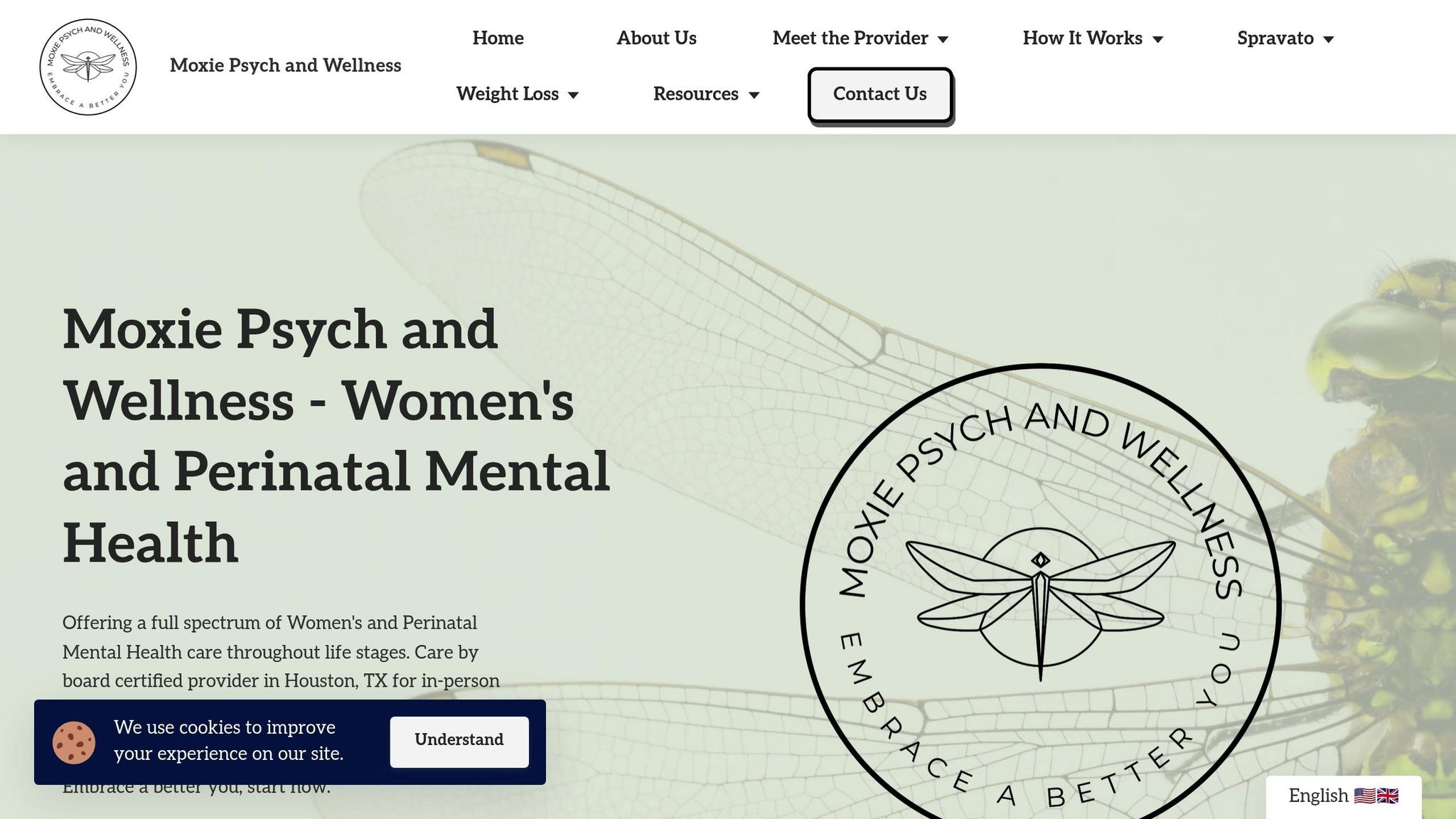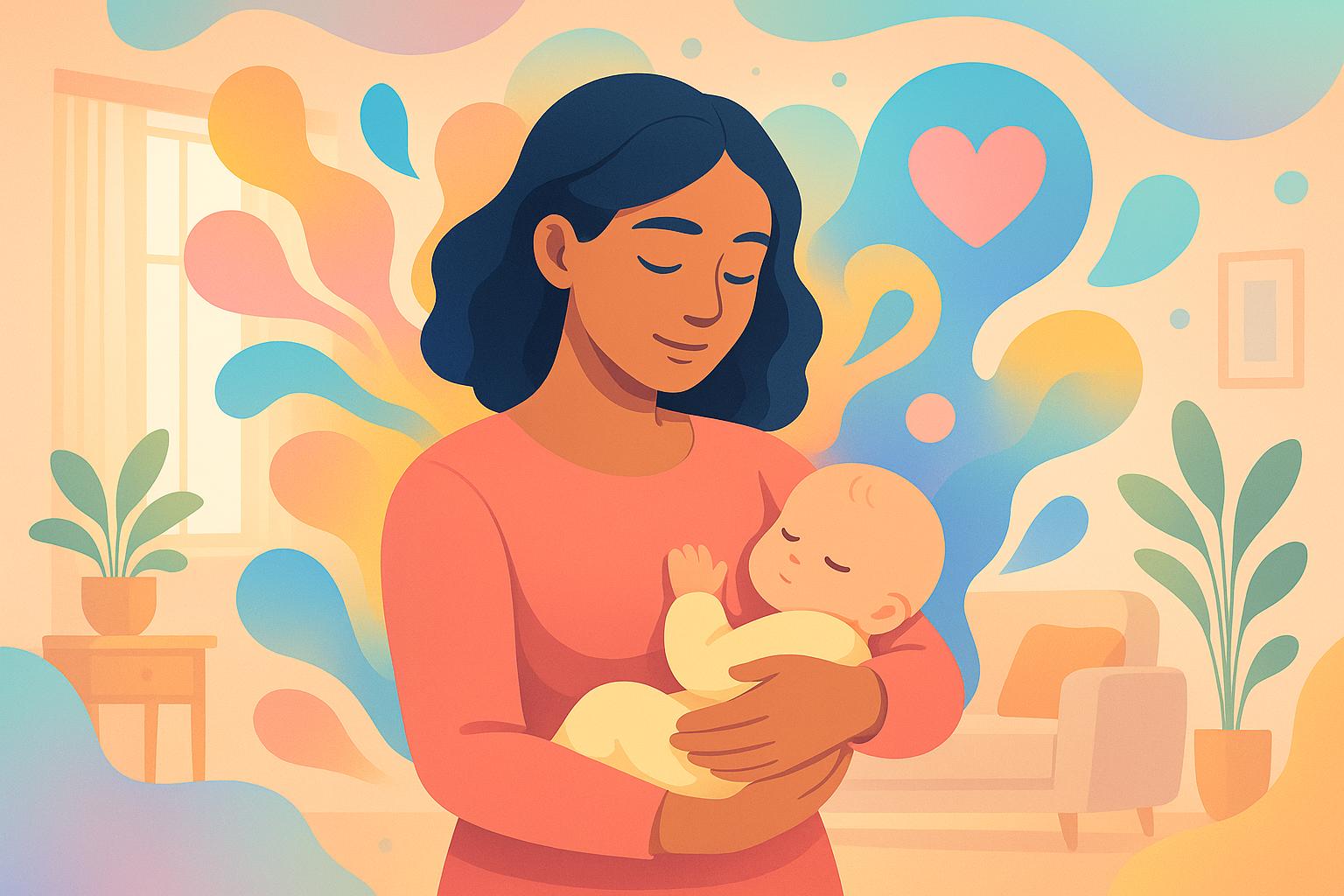Women with both PTSD and addiction face a hard loop where one makes the other worse. PTSD comes from bad events like assault or home abuse, and leads to deep upset and distress. To deal with these feelings, some may turn to drugs or alcohol, but this can make PTSD worse, making a bad cycle.
Key things to know:
- Women are 2-3 times more likely to get PTSD than men, often because they face more trauma.
- Around 40% of those with PTSD also have issues with drugs or alcohol.
- Day-to-day life gets tough, hurting how they manage with family, work, and health, especially for moms with kids.
Getting help can be hard due to shame, money worries, few trained helpers, and fears of losing their kids. Old ways of help often don't meet women's needs, so all-in-one care is key. Plans like Cognitive Processing Therapy, Eye Movement Therapy, and Dialectical Behavior Therapy look good as they handle both PTSD and addiction at once.
Places like Moxie Psych and Wellness give special care that includes solutions that fit each person, online help, thinking of childcare, and being gentle with trauma. With proper support, women can break away from the PTSD and addiction cycle and get their lives back.
Therapy for Trauma and Addiction in Women (2019)
How Hurt Leads to Bad Habits in Women
Studies show a strong tie between hurt and bad habits in women, showing why many women have both bad stress after hurt (PTSD) and issues with using too much stuff.
How Hurt Touches Your Mind
Hurt can mess up the body’s stress fix system, filling it up with stuff like cortisol and adrenaline. When this stress stays for long, it can change key parts of the brain linked to memory and feelings, like the hippocampus. These changes often make it hard to deal with hurt memories, leading to bad dreams and unwanted thoughts. At the same time, hurt can mess with the brain’s happy system, making people feel tired or always on alert. To hide these strong feelings or seek quick peace, some may turn to stuff. This mix of stress and self-fixing leads to more use of stuff.
Hurt as a Risk for Using Stuff
Hurt greatly ups the odds of using stuff in women. Many women use stuff to deal with the heavy weight of hurt or to calm unwanted memories. Hurtful times, from being a kid or a grown-up, often guide how a person picks stuff and finds ways to cope. For good healing, help must look at both the hurt and the use of stuff, as they are closely linked.
Numbers on Hurt and Bad Habits
The facts back what docs see: hurt has a big role in bad habits. Many women in help for using too much stuff talk about past hurt, and women with PTSD are really at risk for having stuff-related problems. These numbers show the need for help methods that deal with both hurt and bad habits at the same time, giving a fuller way to get better.
Living with Both PTSD and Addiction
Women who deal with both PTSD and addiction fight a hard fact where each issue adds to the other, making a loop that's tough to stop. We will look at the signs, daily problems, and the hard parts of treating these mixed issues.
Common Signs of Both Problems
When PTSD and addiction hit at the same time, the signs often mix up, making it hard to tell them apart. For instance, sleep issues are a big deal. Bad dreams from PTSD often mix with signs of not using or sleep troubles from drugs, making good sleep almost not there. Worry is also always there, either from past hurts or from wanting drugs.
Feeling apart - like you're not with what is real - is another way people cope. In flashbacks, women may feel apart from their bodies, and drugs often make this empty feeling stronger or make them feel alive again. This makes it all blend together - real feelings with those changed by drugs.
Using many drugs happens a lot, as different drugs are used to handle different signs. Alcohol might calm worry, sleeping pills might bring on sleep, and stuff that wakes you up might fight tiredness. This risky mix ups the chance of bad mix-ups and even taking too much.
Keeping emotions even is very hard. Many women say it's like being on a wild ride, swinging from strong fear and anger from PTSD to the ups and downs from using drugs. Even small things can lead to big bursts of feeling or shutting down.
Daily Life Problems
The mix of PTSD and addiction leaks into every part of daily life. Relationships often suffer, as loved ones can't get the wild acts. Women may lash out during flashbacks, vanish during drug binges, or pull back all together, leaving family and friends lost.
Work and keeping a home are often upset too. Money troubles from drugs and hard times with focus or getting along at work often lead to losing jobs. Wild acts can make keeping a home just as hard.
Health gets really bad when both issues are there. Hurt already taxes the body, and drugs only make it worse. Many women ignore big health issues, too caught up in getting their next fix or dodging withdrawal.
For moms, taking care of kids becomes almost too hard. The unsure nature of their signs makes it hard to care well. Many moms feel deep guilt over how their struggles change their kids, which can push them to use drugs more as a way to hide that shame.
How Dual Diagnosis Differs from Single Problems
Handling both PTSD and addiction is much more complex than just one issue alone. The mix makes signs louder and recovery a much harder climb.
Healing often takes more time for women with two issues. It often needs many tries at help and long-term care. They may fall back to old ways more too, as one problem can easily start the other.
Being alone gets worse when both are there. Someone with just PTSD might keep some friends, but adding drug use often means they lose all help from others.
The danger of self-hurt and ending life goes up a lot with both. The pain from bad past events, plus the rash moves and gloom from drug use, make for a risky mix.
At last, dealing with the law happens more. Drug use might get you taken by the cops, while PTSD might make one act rough or choose poorly, leading to law troubles. These extra legal issues just add to the stress, making it harder to deal with both problems.
sbb-itb-3d00657
Care Choices for PTSD and Addiction in Women
Care that deals with both trauma and drug use is key for women with these two hard issues. Here are some main ways that show why we need care that knows about trauma and is right for each woman.
Therapy Plans for Trauma
Therapy that focuses on trauma aims to help women deal with past hurts while also helping with their fight against addiction. Cognitive Processing Therapy (CPT) helps them think differently about their trauma thoughts and find new ways to handle triggers. Also, Eye Movement Desensitization and Reprocessing (EMDR) uses eye moves guided by a therapist to help sort through trauma memories in a less hard way.
Dialectical Behavior Therapy (DBT) teaches skills to handle strong feelings, which can cut down on drug use. The Seeking Safety plan puts first making sure the woman feels stable now before looking at deep trauma. These care ways work on both problems at the same time, which can make getting better last longer.
Why Usual Drug Care Methods May Fail
Regular drug programs may not meet the special needs of women who have been through trauma. Many old ways, like 12-step plans, make you say you are powerless. This might make women who have been through trauma feel even weaker.
Hard ways that point out denial might make already alert women feel worse. Therapy with both men and women can make some women feel not safe, especially if they have faced sexual harm. Drug clean-up care alone often does not look at how trauma symptoms might get worse when getting off drugs, which can make women drop out or relapse more. These usual plans also miss key facts like child care, home harm, and how society sees them, which hurts women more.
Common Blocks to Getting Care
Women run into many blocks when trying to get the right help for PTSD and addiction, such as:
- Stigma: Women often face more bad judgment and shame about mental health issues and drug use.
- Childcare Duties: Hard schedules make it tough for them to go to sessions often.
- Money Issues and Insurance: Low money and not enough insurance often block long care.
- Fear of Losing Custody: Worry about who will keep the kids can stop women from getting help.
- Not Enough Trauma-informed Providers: Many mental health workers do not know how to help with the link between trauma and addiction.
- Travel and Place Problems: Bad transport or far centers can keep women away.
- Lack of Support from Partners: Partners who do not help or try to control can make it tough for women to get and keep care.
These blocks show why we need care choices made for women. At Moxie Psych and Wellness, we deal with these with flexible times and the choice to meet online. Our care fits into women's lives and mixes mental health help with practical fixes for daily issues.
The Need for Personalized Care
Care just for women is key when dealing with PTSD and addiction. Usual care plans often miss the special needs linked to a woman's body, emotions, and social roles. For example, women tend to get addicted more due to things like changes in hormones, high trauma rates, and using drugs to deal with sad feelings. They also get more anxiety and depression. What's more, women face extra problems like looking after family, relying on others for money, hard to find special care, and facing harsh judgments. Care that knows these women's needs can make a safe, understanding, and trusted space - all important for getting better. Moxie Psych and Wellness keeps this need for personalized care at its core.
Services Offered by Moxie Psych and Wellness

Moxie Psych and Wellness gives care that fits each woman, through face-to-face and online check-ups. They think about things like hormone changes, being pregnant, and nursing when managing meds. It's very important for women with PTSD and addiction to find the right med mix. They also have Spravato for tough cases of sadness. With a top-level service style, every woman gets a care plan made just for her needs and goals.
Complete Wellness Approaches
Moxie Psych and Wellness uses a full way to heal, mixing special treatments with real day-to-day help. Wellness looks at how trauma and drug use hurt a woman's mind, feelings, and body together. Care often includes special therapies that let women work through their bad past safely while dealing with other problems like anxiety and depression. Healthy physical care is a main thing, too, more so when dealing with pregnancy or nursing. Apart from therapy, help like teaching parenting and handling money builds a strong start for getting better. This whole view aims to not just beat trauma and addiction, but also build a life of meaning and joy.
End: Ending the Tie of Hurt and Need
PTSD and addiction in women make a tough loop that needs sharp and wise help. Women face big block in getting past this loop, but knowing how hurt and drug use link can set the stage for better recovery steps.
Key Points
- The tie between hurt and need goes round and round. Women with PTSD may use things to lessen the pain of bad pasts, but using stuff can make hurt signs worse, trapping them in a bad cycle.
- Women live through things that are not the same. These include body changes and more hurt acts. This can make usual, man-focused healing ways work less well.
- Mixed healing is key. When PTSD and need arise together, it is key to deal with both at once. Caring for one without the other often ends in not full healing.
- Big blocks to getting help are there. Women deal with things like child care, money ties, shame, and not much access to hurt-aware care, all of which can stop them from seeking and keeping care.
By looking at these things, the way to get better is more clear, showing the need for made support and more knowing.
Why Care that Knows Hurt Matters
Getting free from the hurt-need loop leans on care that knows the special needs of women. This care deals with both PTSD and need, thinks about body and birth health, and makes a safe, warm place to heal.
Moxie Psych and Wellness shows this way by giving made mind health help. Their care includes face-to-face and online checks, drug care made for women's body needs, and special treatments for hurt-linked health issues.
As we've seen, healing can happen when care is mixed and made personal. With the right help, women can beat the struggles of PTSD and addiction, finding power in treatments that deal with their hurt, give real ways for daily issues, and build on their tough spirit. More reach to care that knows hurt and fewer blocks can free more women to take back their lives and move towards a brighter, fuller tomorrow.
FAQs
Why might drug help not work well for women with a past full of hurt?
Often, drug help doesn't work well for women with hurt in their past because it misses how hurt and drug use are close friends. Many women getting better have gone through deep hurt like being hit or sexually abused. This not only makes the drug problem worse but also makes getting better very hard.
For women, care that knows about trauma is key. It looks at how the hurt affects their mind and thinks about the special blocks women have when getting better. Without this kind of care, normal plans may ignore important parts of their healing, which can cut down their chance to get better for good. Plans made just for women can give the kind and special care they need to really heal and make their lives anew.



